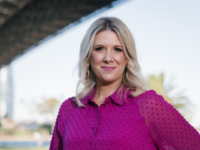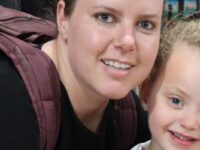This week we chat to Kiri Yanchenko, founder of Amperna, a skincare brand that creates products specifically formulated to be comfortable for those with the most sensitive skin. Unable to find a product to help cure major irritations brought on my medication required for a serious health issue, Kiri spent years researching and testing to come up with a solution of her own, and is now sharing the solution she came up with via Amperna.
ISB: What was the “lightbulb moment” behind the founding of Amperna?
KY: I have always had my own freelance business in the FMCG design industry which my father helped me start after university. When my husband and I had to look after my dying father, I took medication that didn’t agree with me. One of the side effects was pustular acne and I was offered more medication to cure this. I decided to help myself holistically instead. My lightbulb moment came about because of these health issues. When I was well again, I decided I wanted to help people in the same way, so the brand was born from there.
ISB: How did you fund the setting up and early-stage operations of the business?
KY: I mentioned looking after dad who passed away at 62. This meant that I received an inheritance early on in life. After researching my business idea and working out that it could be viable, we sat down and projected how much it would cost. We talked about different funding options; an investor was out because of the financial projection obligations and losing control of part of the business. I looked at crowdfunding and decided against that as well. So, rather than jump through hoops to access other capital, we decided to risk our savings instead which has fueled our need to succeed.
ISB: What was the biggest challenge you faced in getting the enterprise off the ground?
KY: The biggest issue I had was the fact I had no idea how to start a product-based business. My background meant that I had an idea from a branding, packaging and marketing perspective. My husband is an automations specialist, so he was able to help with our website and manage the finances. I found a brand strategy mentor to tackle brand strategy first.
Another issue was how to create my products. I found an independent chemist who specialised in skincare. I asked other established businesses questions too, however, most of the learning for me was in getting things done myself.
ISB: Skincare is a very cluttered marketplace – what is your unique selling point?
KY: I felt that there was a gap in the market for “no nasties” active products for even the most sensitive skin that helped people who also suffered from skin concerns like acne, dermatitis, rosacea etc that weren’t strong suppressive medications. So, I decided to create my own unique probiotic skincare. The products and ingredients are inspired by my learnings on holistic skin health and the link that I found between gut health and skin health. We aim to bridge the gap between 100 per cent natural and prescription skincare. We are Australian made-and-owned, no nasties and cruelty-free.
ISB: And how did you go about marketing your products in such a busy space?
KY: Our go-to market strategy involves marketing through social media, word of mouth, targeted online advertising and distribution through select stockists with the goal of helping everybody feel comfortable in their own skin. At the moment we target people with problem and sensitive skin due to our unique value proposition, however, we will be expanding this. We want help everyone in a holistic way and this has been driven by the experience I had whilst I was severely ill and trying to help my own skin.
ISB: Finally, what is the #1 lesson you’ve learnt on your journey you’d share with others who aspire to start their own business?
KY: To just go for it if you need something from someone, you want help or you want to collaborate. Obviously, you have to put the work in and provide a great case to benefit both parties. Don’t be afraid to call someone, to email that potential stockist. The worst thing they can say to you is no. Then you just move onto the next opportunity. You might get a surprise; they might say yes, they might have even heard about you!
















